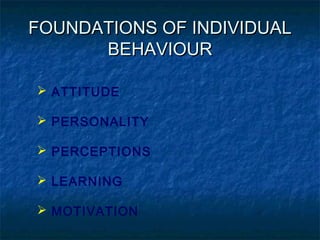Foundations of individual behaviour
•Download as PPT, PDF•
10 likes•15,911 views
managerial process and organisational behaviour
Report
Share
Report
Share

Recommended
This is useful for BBA students OB Introduction, Scope, Challenges and Opportunities, goal and OB Model 

OB Introduction, Scope, Challenges and Opportunities, goal and OB Model Research Scholar - HNB Garhwal Central University, Srinagar, Uttarakhand.
Recommended
This is useful for BBA students OB Introduction, Scope, Challenges and Opportunities, goal and OB Model 

OB Introduction, Scope, Challenges and Opportunities, goal and OB Model Research Scholar - HNB Garhwal Central University, Srinagar, Uttarakhand.
More Related Content
What's hot
What's hot (20)
Challenges and opportunities of organisational behaviour

Challenges and opportunities of organisational behaviour
Notes on Organisation behavior (Introduction Of Organisation Behavior for BBA...

Notes on Organisation behavior (Introduction Of Organisation Behavior for BBA...
Notes on personality in organisation behavior (For BBA/B.com Students)

Notes on personality in organisation behavior (For BBA/B.com Students)
Viewers also liked
Viewers also liked (20)
Organizational behaviour lession 1 development of ob

Organizational behaviour lession 1 development of ob
Day 9 - Foundations of individual and group behaviour

Day 9 - Foundations of individual and group behaviour
Similar to Foundations of individual behaviour
Similar to Foundations of individual behaviour (20)
498971863-psychological notes on Attitude-Ppt-1.pptx

498971863-psychological notes on Attitude-Ppt-1.pptx
Prof. Kanchan.ku.perception,attitude,valuesmotivation,learning.pptx

Prof. Kanchan.ku.perception,attitude,valuesmotivation,learning.pptx
Recently uploaded
God is a creative God Gen 1:1. All that He created was “good”, could also be translated “beautiful”. God created man in His own image Gen 1:27. Maths helps us discover the beauty that God has created in His world and, in turn, create beautiful designs to serve and enrich the lives of others.
Explore beautiful and ugly buildings. Mathematics helps us create beautiful d...

Explore beautiful and ugly buildings. Mathematics helps us create beautiful d...christianmathematics
Recently uploaded (20)
Python Notes for mca i year students osmania university.docx

Python Notes for mca i year students osmania university.docx
On National Teacher Day, meet the 2024-25 Kenan Fellows

On National Teacher Day, meet the 2024-25 Kenan Fellows
Asian American Pacific Islander Month DDSD 2024.pptx

Asian American Pacific Islander Month DDSD 2024.pptx
Explore beautiful and ugly buildings. Mathematics helps us create beautiful d...

Explore beautiful and ugly buildings. Mathematics helps us create beautiful d...
Jual Obat Aborsi Hongkong ( Asli No.1 ) 085657271886 Obat Penggugur Kandungan...

Jual Obat Aborsi Hongkong ( Asli No.1 ) 085657271886 Obat Penggugur Kandungan...
Russian Escort Service in Delhi 11k Hotel Foreigner Russian Call Girls in Delhi

Russian Escort Service in Delhi 11k Hotel Foreigner Russian Call Girls in Delhi
ICT Role in 21st Century Education & its Challenges.pptx

ICT Role in 21st Century Education & its Challenges.pptx
Unit-V; Pricing (Pharma Marketing Management).pptx

Unit-V; Pricing (Pharma Marketing Management).pptx
Foundations of individual behaviour
- 1. FOUNDATIONS OF INDIVIDUALFOUNDATIONS OF INDIVIDUAL BEHAVIOURBEHAVIOUR ATTITUDE PERSONALITY PERCEPTIONS LEARNING MOTIVATION
- 2. ATTITUDESATTITUDES Definition Attitude is the mental state of readiness, learned and organized through experience, exerting a specific influence on person’s response to people, object and situations with which it is related. Attitudes are learned predispositions towards aspects of our environment. They may be positively or negatively directed towards certain people, service or institutions.
- 3. Characteristics of AttitudesCharacteristics of Attitudes Attitudes are learned Attitudes are predispositions to respond to a set of facts Attitudes are evaluative statements. Everybody, irrespective of age or social status, hold attitudes.
- 4. Components of AttitudeComponents of Attitude Affective Cognitive Behaviour attitude
- 5. ABC ModelABC Model Affective component : feelings, sentiments, moods and emotions about a person, event, idea or object. Behavioural component : predisposition to form a favourable / unfavourable evaluation of something. Also called overt component. Cognitive component : beliefs, opinion, knowledge or information held by the individual. STIMULUS AFFECT COGNITION BEHAVIOUR
- 6. Formation of attitudesFormation of attitudes attitudes Experience AssociationsEconomic status Family Neighbourhood
- 7. Influence of AttitudesInfluence of Attitudes Influence perceptions Job- satisfaction Job involvement Organizational commitment
- 8. Attitudes Vs ValuesAttitudes Vs Values Values : represent long lasting beliefs about what is important. Evaluative standards that help us define what is right or wrong. General beliefs about life, and stands in relation to some custom / cultural practice or norms. Enduring and resistant to change. VALUES LAY THE FOUNDATION FOR ATTITUDES AND MOTIVATION
- 9. PERCEPTIONSPERCEPTIONS Definition It is the intellectual process by which a person acquires information from the environment , organizes it and obtains meaning from it.
- 10. Process of PerceptionProcess of Perception PERCEPTUAL ORGANIZATION INPUTS OUTPUT Objects Events People Selection Organization Interpretation Actions Attitudes Beliefs Feelings
- 11. SelectionSelection Selective perception involves two psychological principles : Figure ground principle Relevancy
- 14. OrganizationOrganization Grouping : people/things can be grouped together due to similarity or proximity Closure : tendency to fill in gaps due to incomplete information to make them more meaningful. Simplicity : ignoring less important information and focus on important to overcome problem of overloading & complication.
- 15. InterpretationInterpretation Interpretation is a subjective and judgmental process. this process is influenced by : Halo effect Stereotyping Attribution Projection
- 16. Factors influencingFactors influencing PerceptionPerception Internal factors : Needs & desires Personality Experience External factors : Size Intensity Frequency Status Contrast